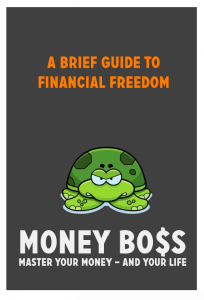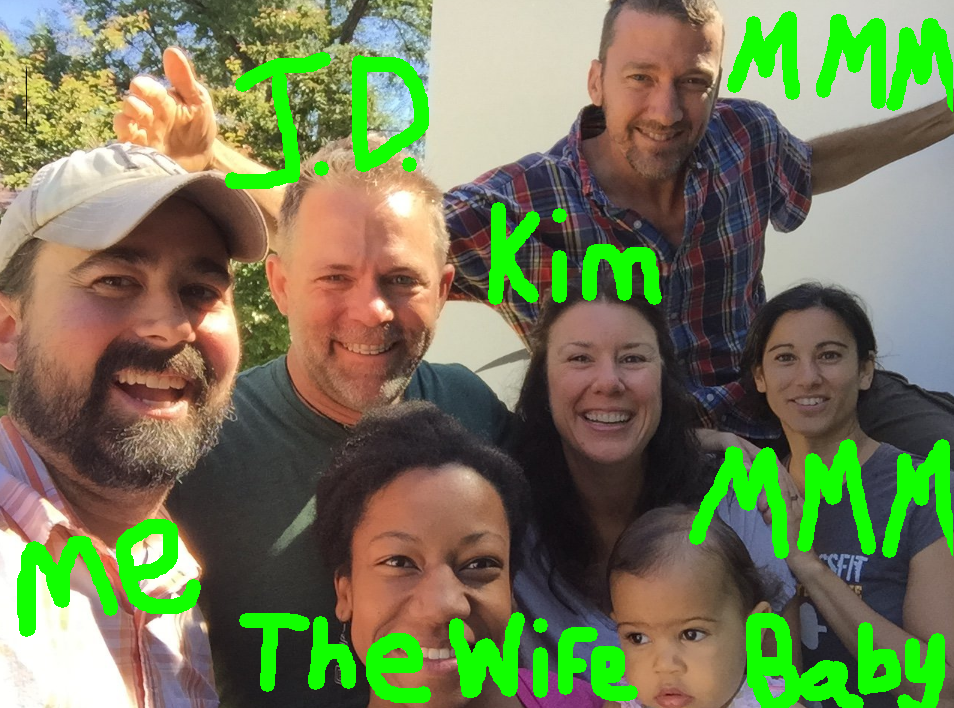 Today I’m comin’ at you with a free e-book from J.D. Roth at Money Boss.
Today I’m comin’ at you with a free e-book from J.D. Roth at Money Boss.
It’s called A Brief Guide to Financial Freedom.
Weighing in at 73 pages, it’s pretty beefy for a free e-book. Me like!
Enough talk, let’s do some fun learnin’.
Here are my main takeaways from the book.
Treat your personal finances like a business.
Ask yourself, “What if I made decisions in my personal life as if I were making them for a business?”
J.D. talks about how he was really good at making the numbers add up for his businesses while at the same time he was terrible at managing his own personal finances. The turning point was when he started thinking about and treating his personal finances as if he were running a business. Even thinking in terms of “profit instead of savings”. (More on this idea below.)
Master of your own fate.
Another way the book shapes the conversation from the beginning is with this statement…
Instead of assuming you’re a victim of circumstance, I assume that you are the master of your own fate.
This mindset statement comes early in the book for a reason. If you don’t believe and behave like you are in charge of your own life and capable of making changes, the rest of the advice in the book won’t work.
Profit instead of savings.
According to J.D. the word savings is bor-ing! And I agree.
If we are going to think of our personal finances as a business it makes sense to use the word “profit” instead of “savings”. It also changes the way you think and feel about your personal money. Making a profit of $500/mo sounds way cooler than saving $500/mo. It feels more serious and more business-like but at the same time it feels more fun and less like a chore. Saying “profit” also makes it feel like you are actually getting somewhere.
A quote from the best book ever even makes an appearance!
In The Millionaire Next Door, authors Thomas Stanley and William Danko share what they learned through years of academic research into the habits of America’s wealthy. Here’s one key takeaway: “What are three words that profile the affluent? FRUGAL FRUGAL FRUGAL…Being frugal is the cornerstone of wealth-building.”
(Read my review of The Millionaire Next Door)
Earn more!
Chapter five states, “The more you learn, the more you earn.”
I didn’t think much of this statement at first. But then it hit me when I reverse engineered the statement and turned it into a question, like some sort of word-ninja. Goes like this…
Why would you expect to get paid more if your aren’t more valuable?
You’ve got to learn new knowledge or acquire a new skill in order to make yourself more valuable in order to earn more money. OR, you need to APPLY existing knowledge and skills that aren’t currently being applied. For example… a scientist gets paid more than a science teacher, same skills and knowledge but applied in a different way in a different place.
A simple idea but one that could change your life if you apply it. Don’t just ask for a raise, make yourself more valuable.
The most powerful force in the universe!
One dollar saved is worth more than one dollar spent.
Mind blown!
Of course I know this to be true, but this reminder was helpful. When you save a dollar, you aren’t just saving a dollar, you are saving MORE than a dollar. WTF! AWESOME!
If you spend one dollar you could have invested, you don’t just lose that dollar but any future return you might have earned on it. Assuming typical stock-market growth, that dollar would have a value of $1.93 ten years from now – and $7.20 in thirty years. (This effect is called “compounding”, which Einstein reportedly called “the most powerful force in the universe”.)
Mindless spending, mindful spending and conscious spending
Another great reminder that so many people spend money “mindlessly”. No wonder you aren’t getting anywhere! J.D. explores the difference between mindless, mindful, and conscious spending and how to apply it to your own personal finances.
There’s a great chapter on how to get started investing.
(Just go read it for yourself!)
The six stages of financial freedom.
I liked this part because it shows that there are many smaller wins along the path towards the ultimate goal of financial independence.
Each milestone is a win to be celebrated. Getting out of debt, building an emergency fund, saving your first $20,000, those are all big wins that you should celebrate.
It’s motivating to recognize progress along the path towards financial independence. When you think about it, every single dollar you save is a win. It’s all the small wins that add up to the big ones so we might as well celebrate along the way.
Appendix A: Get out of debt.
Very sexy title.
I was happy to see this chapter thrown in, even if was an “after thought.” (I don’t think it was actually an after thought. I think he added it because it’s so important but didn’t really fit in with the rest of the book.)
Like J.D. says in this chapter, getting out of debt is so important. It’s where most people start their financial journey. Being in debt can discourage people from even trying. But here’s some good news…
Getting out of debt has the highest guaranteed return on investment possible. When you pay off a debt, it’s 100% gone forever. If you buy a stock or a mutual fund, it goes up and down and you run the risk of losing your money. Not so when you pay off a debt, that debt is gone forever. There’s no danger of the debt somehow returning. Make sense?
J.D. mentions that debt reduction ought to be a side effect, not a goal. Focus on changing your financial habits, attitude, and behavior and becoming debt free will be a result of those changes.
He mentions non-financial benefits to paying off debt. One of which is peace of mind.
Money is so emotional and being in debt can have really difficult emotional baggage tied to it. This chapter mentions 3 different plans for getting out of debt, one of which I had never heard of and really liked!
- Debt snowball: Pay smallest balance first. (Recommended)
- Debt Avalanche: Pay highest interest rate first.
- Debt Tsunami: Pay off the debt with the most emotional baggage first. (Love it! I had never heard of this one!)
In conclusion, dude.
If I haven’t convinced you by now, maybe this chunk of the introduction will…
For many, money is a mystery. It’s not the numbers that are complicated – the math behind wealth-building is shockingly simple – but it’s the mental baggage that bogs us down: the psychology, the emotions, the discipline, the peer pressure. While the majority of Americans struggle with their personal finances, the basics of business are baked into our national subconscious. We all get that in order to survive and thrive, a company has to make money. What most people fail to grasp, however, is that the same concept holds true for household finances. I want to change that. This brief guide to financial freedom has one goal: To teach you the fundamentals of financial independence.
Download this bad boy for free here and become a Money Boss!
https://moneyboss.com/brief-guide-to-financial-freedom/
-Derek
P.S. Check this out!!! We met up with J.D., Kim and Mr. and Mrs. Money Mustache during our five month road trip. Fun was had. I can not share details. haha! I basically peed in my pants the entire time being around such majesty.

